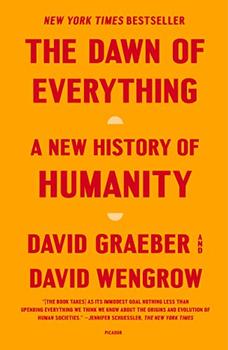Summary | Excerpt | Reviews | Beyond the book | Read-Alikes | Genres & Themes | Author Bio

The World Shaped By Us
by Diane AckermanIn The Human Age, Diane Ackerman takes a close and surprisingly optimistic view of our current epoch which scientists are calling the Anthropocene — "the age of human-ecological impact." Early on Ackerman tells readers that the book looks to examine what the future might hold given a whole host of issues unfolding today. Taking into consideration the latest technologies, the vast amount of information available online, and the advances in medicine and abilities to improve the human body, she sets out to answer whether or not it's still possible to fix the mess we've gotten ourselves into. This is a heavy question, but Ackerman's overriding view is that while we human beings have created serious and threatening environmental chaos that urgently needs to be reined in, she remains enormously hopeful, reminding us that we are thinkers, builders, rearrangers, and inventors.
She believes our abilities and innovations can and will help people adapt, and goes about convincing readers by introducing us to the people who are actively involved in helping to mold this future. Mohammed Rezwan, who founded a nonprofit in Bangladesh that helps people adapt to the ravages of ever-worsening floods, is one such person. His organization, Shidhulai Swanirvar Sangstha, has created a floating community — a fleet of 100 boats that accommodates libraries, schools, health clinics, and gardens. These are outfitted with solar panels, pumps, computers, and other necessities, allowing people to ride out the floods while continuing on with their lives.
Filled with wit, humor, and poetic sensibility, The Human Age bubbles over with contagious enthusiasm, and is in many ways, a song of praise. As Ackerman affectionately describes the world we live in, we start to see it with fresh eyes and to fall in love with it. Her enthusiastic approach extends to her research — she has traveled all over the world to meet scientists, environmentalists, urban designers, inventors, and those on the cutting edge of technological development, accompanying an aqua farmer to check on his lateral kelp beds in the ocean, and others into their labs, design studios and think tanks. The book explores and examines numerous innovations from vertical farming in the ocean (long ladders of kelp and crops of oysters and mussels tended and harvested in the depths of the ocean) to biomimicry (buildings that resemble growing organisms). We're introduced to 3-D bioprinters that use living cells to create new body parts. Washington State University researchers have used this method to "print" tailormade bones for use in orthopedic procedures. Then there's the Frozen Ark Project working to save samples of frozen cells containing DNA from endangered animals before they go extinct.
The writing is sensually rich and beautifully crafted. Listen to how she tells us about one use of collective body heat:
...consider Scandinavia's busiest travel hub, Stockholm's Central Station, during morning rush hour on a blustery day in January. Outside, it's -7o F, the streets are icy as a toboggan run, cold squirrels around your face, the air feels scratchy, and even in wool mittens your hands are tusks of ice. But indoors is another country, a temperate one filled with a living mass of humans heading in all directions. Pocketing the windfall, engineers are harnessing the body heat issuing from 250,000 railway travelers to help warm the thirteen-story Kungsbrohuset office building about a hundred yards away.
Ackerman's revelations and observations are accompanied by gentle reminders about paying attention to consequences and ethical dilemmas. For example, if we can soon regenerate new body parts as needed, will we evolve to be weaker and more flawed as a result? But despite her concerns, she never lectures or takes on a scolding tone. Rather, Ackerman exudes affection and wisdom, extending an invitation to become earth restorers and guardians.
The Human Age left me with a new sense of hope about what it means to be a human in the world today. It is an insightful, informative and thoroughly entertaining read that I would enthusiastically recommend to everyone.
![]() This review was originally published in The BookBrowse Review in September 2014, and has been updated for the
October 2015 edition.
Click here to go to this issue.
This review was originally published in The BookBrowse Review in September 2014, and has been updated for the
October 2015 edition.
Click here to go to this issue.

If you liked The Human Age, try these:

by David Graeber, David Wengrow
Published 2023
A dramatically new understanding of human history, challenging our most fundamental assumptions about social evolution―from the development of agriculture and cities to the origins of the state, democracy, and inequality―and revealing new possibilities for human emancipation.

by Jane Goodall, Douglas Abrams
Published 2022
In this urgent book, Jane Goodall, the world's most famous living naturalist, and Douglas Abrams, the internationally bestselling co-author of The Book of Joy, explore through intimate and thought-provoking dialogue one of the most sought after and least understood elements of human nature: hope.
Your guide toexceptional books
BookBrowse seeks out and recommends the best in contemporary fiction and nonfiction—books that not only engage and entertain but also deepen our understanding of ourselves and the world around us.